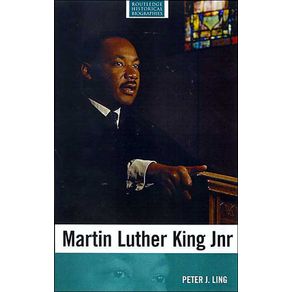Who was Martin Luther King, Jr.? A successful reformer or a failed revolutionary? A maker of the movement or a product of it? In a powerful reinvestigation of both the man and the cause, this brilliant new biography deftly traces how King grew into his leadership role, and grew stronger in faith after 1965 as the movement itself weakened and the challenges deepened. Historian Peter Ling chronicles King's seven-year struggle to transfer successful leadership of the Montgomery Bus Boycott onto the national stage. He reveals the ambiguities and fragility of his nonviolent protest methods, even during their period of greatest apparent success (1963-1965), and celebrates King's, heroic, though failing efforts to develop nonviolence as a means of addressing ghetto inequalities and opposing America's involvement in Vietnam. By the time of his murder, Lings shows, King knew he was "going for broke," and developed more radical stances in the face of a strengthening right-wing counter-movement.Capturing the drama, irony, and pathos of King's life, this textured, accessible biography gives proper weight to the contentious final two years of King's life.



